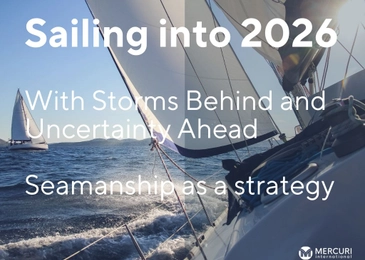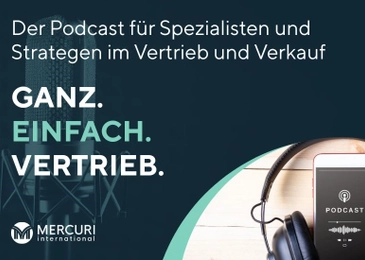Ever walked out of a client meeting feeling great…but without a signed deal?
That’s exactly what Claudia Sperling and Senne Vanwetswinkel, experienced consultants with Mercuri International, unpack in our latest podcast episode. Because too many sales conversations end in *consulting*, not *closing. *
Here’s what you will learn:
- Why “I don’t want to pressure them” is a silent deal-killer.
- How *follow-up* is not harassment, it’s customer service.
- Why 80% certainty is enough to decide.
- And how small, confident questions turn “maybe” into “yes.”
Our favorite insight: “Consulting without a closing question is like a job interview where nobody talks about the salary.” Selling means *guiding* the customer to a decision — not waiting for one.
Listen in and ask yourself: When was the last time you gave great advice… but didn’t close the deal?
Would you like to dive deeper into the topic of leadership in sales or learn more about Sales Excellence? Get in touch with Claudia Sperling: https://www.linkedin.com/in/claudiasperlingmercuri/ or Senne Vanwetswinkel: https://www.linkedin.com/in/sennevanwetswinkel/.
Simply subscribe to the podcast via your preferred platform:



For more information and inspiration on current sales topics, visit: https://mercuri.de
Did you enjoy this episode?
Please give us a five-star rating and subscribe to the Mercuri International Sales Podcast.
We also appreciate detailed feedback – feel free to write to us at info@mercuri.de.
This helps us continuously improve our podcast and create relevant content for you and your company.
Welcome to the Mercuri podcast, Ganz Einfach Vertrieb. My name is Claudia Sperling. I’m a senior consultant at Mercury and focus on professional negotiations. Today, we tackle a challenge many sales people face, closing the deal, not just sharing a good conversation. And with me today is my colleague, Sene van Wetzwinkel from Belgium. Hi, everyone. Hi, I’m Sene. And as a trainer, coach, and consultant with Mercuri Benelux, I worked with sales and leadership teams to help communicate better, sell smarter, and lead with impact. Over the years, I’ve developed programs that make teams perform better while feeling more confident and connected. A lot of my work is about helping leaders grow into their role as a coach and helping sales teams get stronger at prospecting, objection handling, and eventually closing the deal. It’s those pressure moments where trust really matters. Better as leadership or sales, I love helping people turn difficult situations into opportunities for growth. Thank you for taking the time. And let’s be honest, how often do we leave a conversation feeling good, but without any measurable results? So giving advice is good, of course, but selling means closing. So Nora Roberts, a US author for romance novels said, if you don’t ask the answers, always no. So we all probably know stories where we initially did not dare to ask and then ended up after daring a fairy tale. So in this episode, we’ll look at why many salespeople get stuck in the consultant mode, what we believe really leads to closing, and what practical ideas you can implement right away to close more deals. Many salespeople try to be well prepared. They try to know the product, understand the customer, and deliver clear analysis. And yet they still don’t close the deal. It’s like being in a kind of trap because consulting is often a kind of excuse to avoid closing the deal. So what we see in our training sessions when a certain difference is needed is that sales manager often says things like, I don’t want to pressure them or I want to build trust first. Or some even say the customers should decide for themselves. Yeah, we see the same in our country. Yeah, so consulting without a closing question is like a job interview where nobody talks about the salary. In consultative sales, especially in B to B, it’s also crucial to clearly guide the customer toward a decision. Otherwise, we will spend forever consulting, and the competitor will close the deal while we still prepare the ten-spec sheet calculation for the customer. Definitely. So what, in your opinion, are the most common mistakes? Often mistakes and therefore tips go in the direction of assertiveness. For example, mistake number one, the customer will get in touch. Yeah, reality, no, they usually don’t. Tip, follow up is no harassment. It’s customer service. Exactly, because being respectfully assertive at the right moment is key. Yeah, the next mistake is number two. The customer says that they need more information. Reality, often the amount of information is enough. Everything you need is already there. Tip, you don’t need hundred percent certainty. Eighty percent is enough to take a decision. And so, from my point of view, the solution is right. What are your concerns? Could be a typical formulation. Definitely. And it comes down again to assertiveness. Yeah. And mistake number three, the thinking. The customer makes emotional decisions, so I must not be too aggressive. Reality, emotional decisions need clear guidance too. Tip, use clear closing techniques. Exactly. And here is something we often forget. Many customers are ready to commit. They just need a little structure and guidance. That is where what we call the moral pre-agreement comes in. Right. Like if then logic, we all know it from kids. Mom, if I clean up my room, can I watch TV? So they put us in this pre-agreement, so morally. So it’s instinctive. And yet in sales, we hesitate to ask such clear questions. Yes, that is so true. So I advise people to try asking if we can fully meet the points you’ve just mentioned. Would that mean we have a deal? Or something like if a technical site checks out as well, would you be ready to sign? Yeah, it’s not pressure, it’s clarity, you know. It shows you’re listening and confident. And if the customer says, no, not yet, you can still ask, what else would you need to know or what else would need to be resolved? That’s still part of good consulting, but now with a direction. Definitely. And let’s also not forget the psychological side here. What I often see in my training and practice sessions is that salespeople enter the closing phase with something we call the wrong mindset. Because what is your mindset when you start closing the deal? Do you believe that you are cornering or bullying the customer? Or do you look at the facts? and you have a solution. So by assertiveness, you are actually helping the customer solve this problem. This is a different mindset. And if you secretly hope that the customer will decide somehow on its own without you leading the way, I can tell you you’ve already lost. Definitely. So closing is no luck but part of selling. We need to have the clear goal to close and to plan the closing techniques before. But before we even use the closing techniques, we need to know what is the right moment. Exactly. And that’s where closing signals come in. So what kind of closing signals do you look for? You see, we distinguish between verbal and non-verbal signals. Verbal can be things like, could you send me that in writing? What would the next step internally be? Or how long is a delivery time? These are clear signs of interest. Nonverbal signals could be something like the customer takes a proposal in their hands, they sit up straight and become visibly alert, or they start nodding while you speak, or they call it a colleague. Yeah, and when we spot these verbal and nonverbal signals, it’s time to stop consulting and start closing. So don’t add more complexity at that point here. Don’t keep over-explaining. Instead, Help them to take a decision. That is so true. At Mercury Belgium, we train people to take control of this conversation by provoking these closing signals early with trial closes. In a conversation, this would sound like, how does that sound so far to you? Is this basically a solution that you would consider? Shall we get this started together? You see, this invites commitment rather than vague hope. It’s also signals readiness. In addition, we have the chance to add or change our offer so that all the customer wishes. are fulfilled before we start closing. Yes, and once we see that readiness, here are a few techniques we use. First, alternative question. Would you like to start with option A or go straight to the larger solution B? So this shifts the thinking from if to which one. Or another technique is summarizing and silence. Just summarize the key benefits and then be quiet. Let the customer speak first. And the third one, assumptive closing. Use language that implies the decision is made. So when would you like the first delivery? Actually, this is very powerful because it builds momentum. Definitely. And what you’re actually saying is that closing does not just happen. It’s actually a crucial part of successful sales process. And to close successfully, you need a clear mindset. That is where everything starts. Position yourself as a solution provider with decision-making authority. Be aware of closing signals and act on them. Then you start planning your closing techniques purposefully. Don’t leave at the chance. And most importantly, dare to use closing questions instead of vague hints. And something that we as Mercury with all our training experience would like to advise you is that self-reflection is the key to success. So please think about the following for yourself. What was the last sales situation in which you gave advice but did not close the deal? And what would you do differently today? Yeah, that was Sales Excellence, the macro podcast. Thank you, Zener. The pleasure was all mine. Thank you for having me. So if you enjoy this episode, subscribe and share the podcast with your team or visit us at maguri.de or maguri.be. And remember, selling means guiding the customer to a decision. So until next time and good luck with your confident selling.


